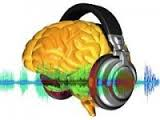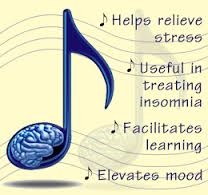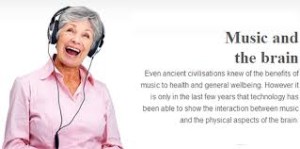STRESS
Another factor in music’s ability to reduce pain likely stems from its competition for our attention. “If you’re thinking about something else, then you’re not thinking about your pain, and you feel less pain,” says psychologist David Bradshaw, who studies pain relief at the University of Utah’s Pain Research Center. Bradshaw’s research shows that the more actively engaged a person is in music, the less pain they feel. For instance, a group of non-musicians asked to listen for errors in a musical passage reported less pain when receiving small electric shocks than those who passively listened to the music.
Other work out of Bradshaw’s lab suggests that certain personality factors, such as a propensity toward anxiety or the ability to become easily absorbed in activities, may lead individuals to experience greater relief from engaged music listening. These findings suggest that physicians should consider patients’ personalities when recommending pain treatment programs.
Listening to a song can have a real effect on various parts of the brain, with studies showing that areas responsible for aspects, such as memory and vision, can ‘light up’ in response to music.
‘There’s a very wide range of reactions in the body and mind to music, and brain imaging studies have shown that various parts of the brain may be activated by a piece of music,’ says Dr Victoria Williamson, lecturer in psychology at Goldsmith’s College, London.
Recommended
‘For example, a recent study in Canada showed that there’s a real causal relationship between music and the reward system, a core part of the brain that reacts to stimuli, which are good for us – food, light, sex for example – and reinforces these behaviors meaning that we do them more.’
Researchers at McGill University in Montreal showed that listening to pleasurable music of any description induced ‘musical chills’, which triggered the release of the feel-good chemical dopamine.
‘We all know from our own individual experiences that listening to music can affect mood,’ says Bridget O’Connell, head of information at the mental health charity Mind.
FOCUS
Music may even be able to help you concentrate.
A new ‘digital tonic’ called U brain, which can be downloaded onto smartphones, claims to be able to help people focus, energize, wake up as well as relax.
The process uses two different beats in each ear to create a third ‘perceived’ beat (a binaural beat), which can stimulate certain activity in the brain.
‘By helping the brain cortex to generate specific brain waves, we can induce different states of alertness, depending on what we aim to do,’ explains Paris-based clinical psychologist Brigitte Forgeot.
‘If we’re feeling anxious or stressed, we can encourage our cerebral cortex to produce slow alpha-frequency brain waves, while on the other end of the scale, if we help our cortex to produce faster beta waves, we will be better equipped to concentrate and focus our attention on a fairly lengthy task.
PREVENTION OF DISEASE by increasing the immunity through music—AMAZING!
Can listening to music actually help prevent disease? Some researchers think so.
Wilkes University researchers looked at how music affects levels of IgA — an important antibody for our immune system’s first line of defense against disease. Undergraduate students had their salivary IgA levels measured before and after 30 minutes of exposure to one of four conditions — listening to a tone click, a radio broadcast, a tape of soothing music or silence. Those students exposed to the soothing music had significantly greater increases in IgA than any of the other conditions, suggesting that exposure to music (and not other sounds) might improve innate immunity.
Another study from Massachusetts General Hospital found that listening to Mozart’s piano sonatas helped relax critically ill patients by lowering stress hormone levels, but the music also decreased blood levels of interleukin-6 — a protein that has been implicated in higher mortality rates, diabetes and heart problems.
FOR DISEASED PATIENTS
Music can actually have a significant positive impact on patients with long-term illnesses, such as heart disease, cancer and respiratory conditions (Home, in nursing homes, hospitals, the office, etc…)
Numerous trials have shown that music can help lower heart rate, blood pressure and help relieve pain, anxiety and improve patient quality of life.
‘Music can be incredibly useful for somebody who is in a situation where they have lost a lot of control from their external environment – say they are in hospital for a long period of time with a serious illness and less able to move around,’ says Dr Williamson.
‘It can give them a sense of control back, as well as creating a calm personal atmosphere and blocking out some of the disturbances around the patient.
According to sports researchers Peter Terry and Costas Karageorghis, “Music has the capacity to capture attention, lift spirits, generate emotion, change or regulate mood, evoke memories, increase work output, reduce inhibitions and encourage rhythmic movement — all of which have potential applications in sport and exercise.”
MUSIC IS AMAZING ON OUR HUMAN BODY REGARDING OUR HEALTH!!
WHAT A GREAT MEDICINE WITHOUT SIDE EFFECTS!!


